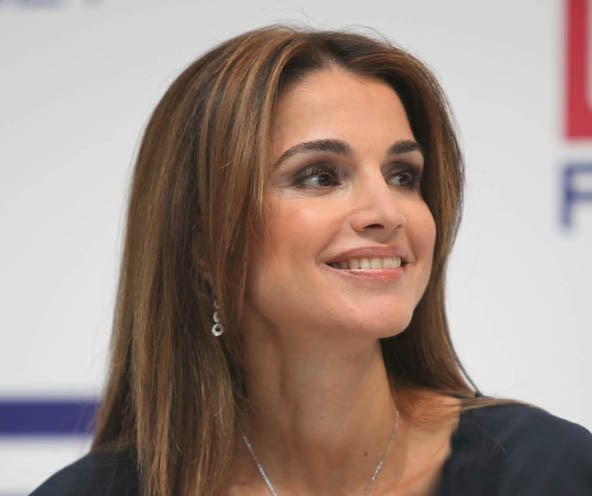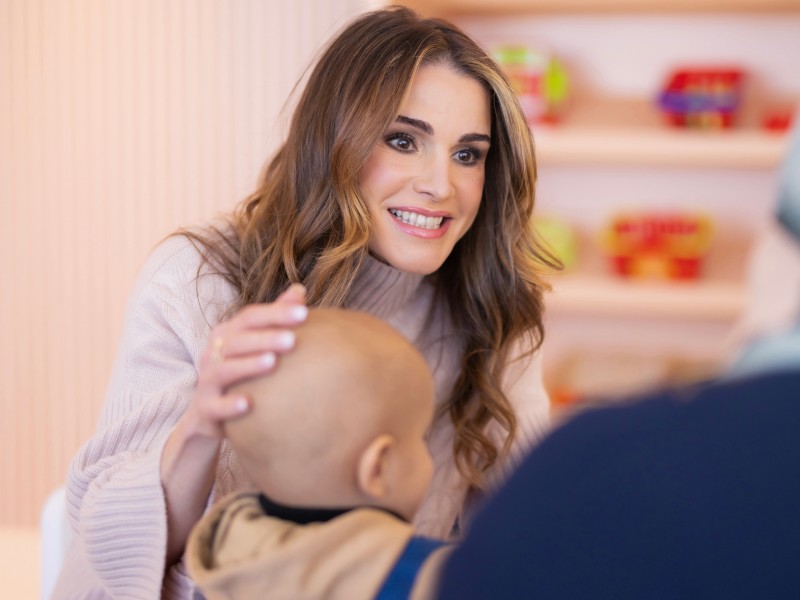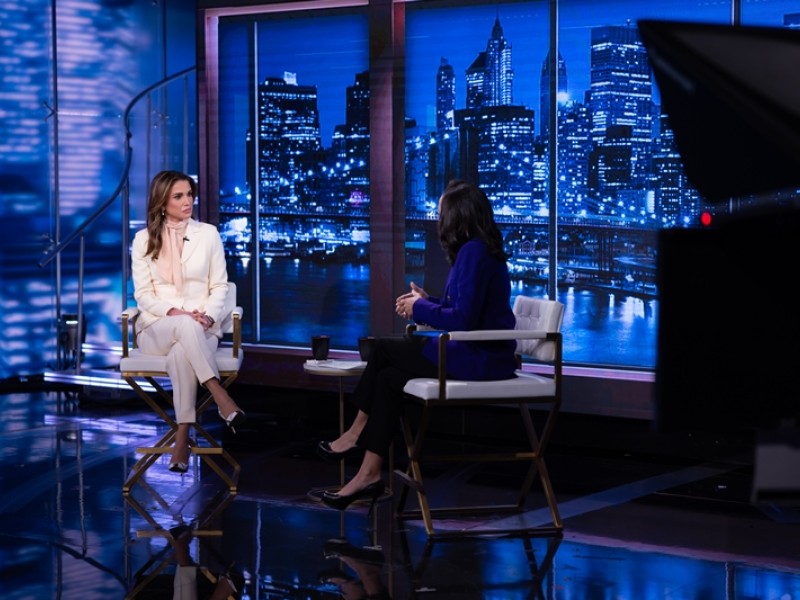مقابلة الملكة رانيا مع قناة فرنسا ٢٤

Queen Rania to France 24: " When you unleash the potential of girls then you really create a tidal wave of benefits that cascade throughout society"
Lanah Kammourieh (LK): Hello and welcome to the France 24 interview. My guest today is Her Majesty Queen Rania Al-Abdullah of Jordan. Queen Rania has come to represent an entirely more modern form of royalty. Embracing at the same time her roles not just as Queen, but also as a wife, as a mother of four and last but not least as a relentless philanthropist who's been very active in defending the rights of women and children across the world. Your Majesty thank you very much for speaking to France 24 today .
HMQ: Thank you. It's a pleasure to be here.
LK: I'm going to start with something that might be surprising to our viewers. You're here in Paris for to attend Le Web, that's Europe's premier internet event, it's a conference about new media and new technologies. Some of our viewers might be surprised to find you at such an event and they might also be surprised to know that you've been a very active user of new media. You have your own You Tube channel, you have over a million followers on Twitter, so my first question to you is very simple, why this interest in
new media?
HMQ: Well you know if you had told me three years ago that I would be attending this conference maybe I myself would have been surprised because maybe I would not have realised that I would be so active on the social web. Now the reason why it's happened is you know our world has changed so dramatically and I find that being on these social networks has helped me tremendously. First of all it's helped me to demystify who I am to people, who I am and what I do. And I find that people can get closer to my virtual self more than they can get close to my real self. Because I think you know in real life people made the position as Queen comes clouded with protocol and people sometimes get a sense of deference which means that they don't feel that comfortable. But on the web people are free to say what they feel, free to give me their opinions, and being closer to people that way has helped me also with my job because it's enabled me to really reach out, raise awareness about certain issues, and rally people behind them. So then for example on top of my agenda is global education and when I launched a campaign for global education I used Twitter to put on messages, let people know facts about it. For example that for every year of quality education income goes up by ten percent. So you know all these things has really helped have really helped me to get my message across and to be part of this community which I hope will be able to change the world.
LK: So while here in Paris you've been speaking about how social media can in fact help bring about social change. Concretely how does this happen? Does it simply help you because it helps you reach out to a wider audience?
HMQ: Well you know so far what we've seen with social media is that it's been predominantly used for people to connect with old friends, to share photos, to it's been used maybe just in a kind of friendly and social way. The next challenge is for us to make the leap from online activism to offline action. To really make sure that our passions and concerns may lead to change on the ground in the real world, and to really break from the digital boundaries of some of our interaction on the web. So for example with education I've launched a campaign called 1GOAL and this is to try to get the seventy five million children who are out of school in to school. And what we're trying to do is connect this campaign with soccer, the World Cup which is happening in 2010 in South Africa. And this is the most watched sporting event. So we want to channel the excitement of football behind education, and we're using the media to reach out, social media to reach out to people. So we're trying to gather thirty million signatures through online activism. Now when you get thirty million signatures that's something that cannot be ignored. That's we take those signatures to world leaders and we say this is what the public want, there is popular demand for you to meet your promises to the children of the underprivileged world. So it's something that pricks consciences, that makes headlines, that accelerates action in the real world. So this is really what we're looking to see how the internet can finally make this leap from being just online interest which can sometimes be fleeting to something that can lead to real change in our real world.
LK: Now about this issue of education it's one that's been very important to you for many years. It's also an issue where we find a massive inequality between boys and girls. Little girls are more often the ones who are deprived of access to education. In your work do you see this changing in the Middle East and elsewhere? Do you have hope that it will change?
HMQ: Absolutely, today we have forty one million girls who are out of school. And in my opinion these girls are trapped and they're untapped. They're trapped in to poverty, in to labour, in to early marriage. And they're untapped by the communities and countries that need them the most. And the fact of the matter is that when you unleash the potential of girls then you really create a tidal wave of benefits that cascade throughout society. Health improves, the economic situation improves, children's future improves, education improves. So I'm really very passionate about making sure that not only do we get all kids in to school but that we make a special focus for girls. And I'm hopeful, we know what needs to be done, we need to reform curricula so that it's more gender friendly, we need to have more female teachers because some parents are more comfortable with that. Some things just as practical as making sure that there are separate bathrooms for girls so that they can maintain their dignity, that the schools are not too far away from their homes so that they are not exposed to danger as they get to school. But most importantly is we have to create a shift in our minds and really realise that girls are just as capable of boys and that we should give them just as much attention, and care in making sure that they get to school. What do we get if we do that? We get more doctors, more entrepreneurs, a more open-minded society and a more tolerant society, so we all gain when girls go to school.
LK: Now earlier you were saying that activism online, things like signing up for initiatives, can help put pressure on governments. I want to talk about one concrete example where we saw social media have a crucial political effect. Over the past summer in Iran we saw that Twitter played a crucial role in the anti-government demonstrations. So social media are not just a means of expression or communication, they can also be a means of resistance, of rebellion, of disobedience sometimes. Do you think that is also a positive use of social media?
HMQ: Well the situation in Iran is a very good example as it was also a means of communication. It was, social media was used to bring out the message because people did not have access to news, to traditional media. So Twitter was used to broadcast events sometimes live from the streets of Tehran, and that raised a lot of concern, a lot of interest all over the world. The thing we have to look at is yes there was a lot of concern, yes people expressed passion behind what was going on and people were calling for change, but how much did it amount to in the end? Is this kind of concern really rooted or is it just fleeting? Because what we find is that with the example of Iran, a while later Michael Jackson died, and
people, suddenly Iran was not as important, it wasn't trending and trending as much as it was at the beginning of the events, and so we will have to make sure that this activism is not just fleeting. That it really takes root. That people just don't pass on the message but actually supplement that message with real action in the real world.
LK: That it can be relayed.
HMQ: And there are many ways that can be done. And this is what I'm challenging people to do today at the conference is to really make that leap from just being online to real world change.
LK: Now staying with Middle Eastern issues you say that social media helped bring about social progress. When we look at Arab countries or Muslim countries, that's one area of the world where internet censorship in some places is still going strong. Do you think that situation is sustainable, can it last?
HMQ: I can speak for Jordan where we don't have internet censorship and absolutely it's not sustainable. It will never last. It's not effective. Anybody who tries to get in the way of people trying to obtain news is first of all I think it's a violation of human rights, and it's and second of all
it's ineffective. People who think that they can do that they are they have outdated thoughts because you can always have a way to get to real information. And you know if people feel that they want to censor instead of putting all the efforts in censoring they should maybe put the effort in trying to fix the situation they had created that they that they want to censor. So if there is an issue on the ground that the people don't want them to know about then maybe you should fix the issue rather than try to cover it with censorship.
LK: One other question. Some people point out a more negative side to social media saying that they can potentially become a tool of surveillance, that they can potentially rob people of their privacy and maybe one day of their rights. Do you think there is a danger there?
HMQ: You know anything has its pluses and minuses, has its advantages and disadvantages, and of course there are some many negative aspects to social media. And we have, and this is a field that's moving very very quickly. So as we move along we really need to make sure that we are aware of the potential dangers, of the challenges that this kind of communication can
represent, and fine tune it and put guards in place to safeguard people's privacy, their rights and their safety at the end of the day. So you know it's something that we have to be very vigilant about. I certainly I'm very concerned when my children are online because again you know we have to be very careful what they get exposed to, and, but I'm confident that as we go
along we will be able to put in, build in measures that protect people. It will never be one hundred percent but you know nothing in life is.
LK: And just very quickly in one word, you're a very public person, what about your privacy? Has this not been an issue for you being so public and so available online?
HMQ: You know to the contrary I feel that I've been able to reach out and make friends and really listen to people in a very natural, uncensored, unscripted kind of way, and that's opened my eyes to how people think, how they feel, and I hope it's given people a window in to my life and helped to demystify a lot of things that people might think of my life. So I like the openness, I like the interaction, I like to be able to connect to so many people all at once. And sometimes when there is an important message that needs to go out there it's fantastic to know that you have a community of people online, and you are just a member of that community, and you can just communicate that message to them very openly. I find that as humans we all want that human interaction, and whether that comes in person or it comes online, it's something that can be very very rewarding and can just enhance our humanity especially if it leads to something positive in the real world.
LK: Well thank you very much indeed Your Majesty Queen Rania Al-Abdullah of Jordan for speaking to us on France 24. Thank you for watching the France 24 interview. More news is coming up very shortly. Do stay with us.
مواضيع مختارة
موقع جلالة الملكة رانيا العبدالله الرسمي
هذا الموقع الإلكتروني لا يدعم متصفحات الإنترنت القديمة. الرجاء تحديث متصفح الإنترنت إلى نسخة أحدث من إنترنت إكسبلورر 9
متصفح الإنترنت الذي تستخدمه قديم. لتحسين مستوى الأمان عند تصفح مواقع الإنترنت و مشاهدتها بالشكل الصحيح و بفعالية افضل قم بتحديث متصفح الإنترنت الخاص بك



